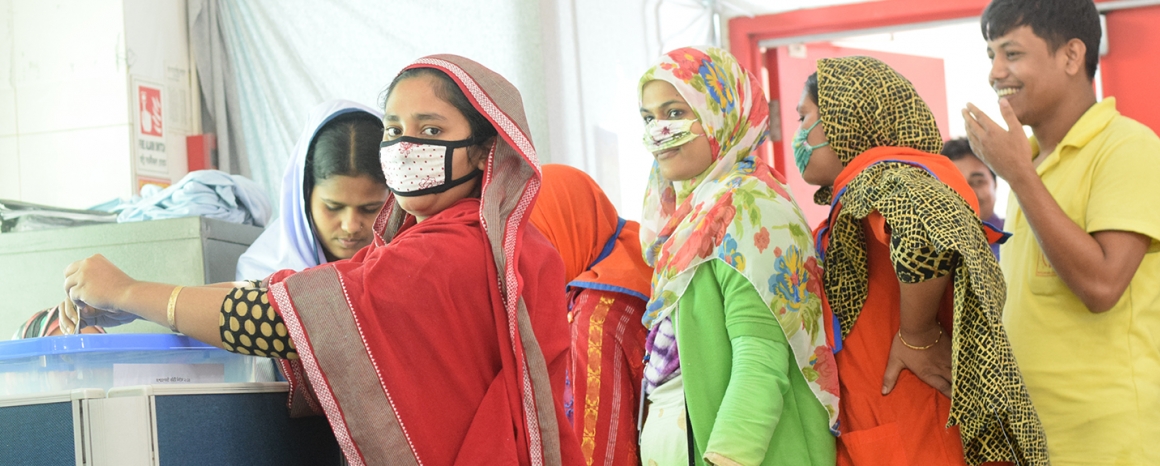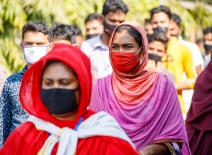Aims
Our programme in Bangladesh aims to ensure that garment workers enjoy better working conditions by having a stronger voice and benefitting from increased gender equality and strengthened climate resilience. We also believe that employers' businesses will be strengthened through improved communications and stronger workplace committees fostering a more motivated and stable workforce, with better-skilled managers and supervisors in place.
Membership, partners & funding
The interventions in Bangladesh are currently funded by NORAD and the Government of Netherlands. Previously we have also received funding from UKAid Direct through an Impact Grant, FCDO, HSBC and Danida. We are currently also working with the Joint ETI membership to outline a sustainable financial cost model / business case for our three thematic components of factory support: increased capacity for Social Dialogue; Gender Sensitive Workplace; and Occupational Health and Safety / COVID-19 response.
Context
The Bangladesh economy remains highly dependent on the ready-made garment (RMG) industry, but an oversupply of unskilled labour, production overcapacity, and market forces have increased production pressure, driven down wages, and led to precarious work conditions. Low pay, job insecurity, lack of union representation and gender-based violence in the workplace are inextricably linked while a lack of education and awareness of rights and benefits on the part of workers has been a major obstacle in increasing worker voice.
Given the low presence of functioning trade unions in RMG factories in Bangladesh (only 7.2% of RMG workers are unionised), the Participation Committee (PC), a structure which each employer having more than 50 workers is legally obliged to establish, should serve as a platform where manager and worker representatives can discuss issues of relevance for the two parties. The PC does not have bargaining power to negotiate a collective bargaining agreement and cannot therefore replace a trade union. Nevertheless, despite its limitations, the PC can play a role in bridging the communication gap and create an environment of mutual trust and cooperation within the workplace, even successfully ease labour disputes, if made functional.
Awareness of health and safety in the garment industry has been significantly raised since the dual tragedies of the 2012 Tazreen factory fire and the 2013 Rana Plaza factory collapse. In September 2021 the new International Accord on Fire and Building Safety took effect, marking an important milestone in continuing to ensure that workers in the global garment industry can work in safe conditions where their rights are respected. Like the PC, an effective and functional Safety Committee within the factory can ensure that effective dialogue between the management and workers is taking place and that occupational safety and health issues can be identified and effectively addressed within the factory.
Women constitute 55 to 60% of the RMG workplace in Bangladesh. Many of these employed women continue to live on the edge of poverty where they remain at the bottom of the supply chain, confronting poor and exploitative work conditions. Employers do not routinely issue appointment letters as required by law. Frequently they retain women employees on a temporary basis with no legal benefits and often resort to dismissal without notice. Female workers are also routinely denied their legal right to maternity leave and many women choose to conceal their marital status to their employers, as factory owners would rather employ single women. Moreover, research[1] has shown that 80% of garment workers in Bangladesh have either seen or directly experienced sexual violence or harassment in the workplace, a key source of anxiety, fear, depression, and stress for female workers.
Our programme
ETI has been delivering a social dialogue programme in Bangladesh since 2015, so far reaching 77 factories supplying to 14 different corporate members. Social dialogue can enable the voice of workers to be heard as a basis for negotiating workplace policies, complaints systems and collective agreements. The programme aims to build the capacity and skills of factory managers, supervisors and elected worker representatives via training sessions designed to increase their knowledge of Bangladesh labour law and their respective roles and responsibilities within the committees while improving their communication skills including receiving and raising workplace issues.
Alongside a classroom-based learning methodology, ETI has implemented a blended learning approach together with the digital training service provider Quizrr. The digital training provides the whole workforce with shared knowledge while the face-to-face training of management, middle management and PC worker representatives brings in-depth focus on relevant skills and knowledge. The tablet training stays at the factory to sustain knowledge and to support the management and worker representatives in their tasks. With the digital training the factory can monitor and measure activities to keep track of training, progress and to identify internal steps and activities as well as share progress data with their customers.
Building dialogue & representation
To further strengthen joint efforts for social dialogue in Bangladesh, the ETI country office is currently developing a platform for representatives from industry associations, global brands, TUs, suppliers, and development partners to share challenges, learning and best practice with regards to social dialogue, gender equality and worker engagement in Bangladesh.
The ETI team in Bangladesh is also implementing a 12-month Gender Sensitive Workplace intervention with the aim to increase female representation in different factory committees including PCs, TUs and Sexual Harassment Complaint Committees (SHCC) and strengthen their capacity to perform their responsibilities as committee members more confidently. The initiative is currently ongoing in 16 factories with additional factories to join.
As part of ETI’s work on Transitions & Futures, our work in Bangladesh is looking at ways to further engage RMG stakeholders on the impacts of climate change on workers. The aim is to organise a multi-stakeholder dialogue on green social dialogue as well as to pilot a green social dialogue intervention with RMG workers and management in 5 factories already graduated from ETI’s social dialogue programme.
ETI has also partnered with 7 corporate members to quickly and effectively address the risks related to a safe return to work following the COVID-19 pandemic. The OHS / COVID-19 response project initiated its activities at the end of August 2020 and lasted for 12 months. See outputs from this project here.
Outputs & achievements
Through the social dialogue programme, ETI has so far directly benefitted more than 136,500 RMG workers in 77 factories. Results measured from an external evaluation of the programme in late 2020 include:
Social Dialogue training helped make PC an effective communication platform
71% of male and 83% of female Participation Committee Worker Representatives (PCWR) and 71% of PC management representatives reported a reduction in communication gap between the parties.
Programme's support starts bringing business benefits to factories
79% of male and 83% of female PCWRs claimed that the overall housekeeping is better now and 32% of male and 64% of female supervisor respondents reported a reduction of late attendance among the workers due to cooperation that PCWRs extended to them in settling workers’ leave.
Training made Participation Committee Worker Representatives more aware of rights and responsibilities
50% of male and 45% of female respondents reported increased awareness of workplace rights and responsibilities
Training was catalytic in transforming supervisors’ conventional management style
75% of male, 90% of female PCWRs respondents along with general workers and PCMR reported that supervisors have changed and/or are changing gradually. Supervisors reported that transformation of their behavior is solving more floor level problems and that workers are paying more respect to them.
Courage and ability of female workers enhanced in seeking remedy when rights are denied
79% of male and 72% of female PCWR respondents reported that female PC members and other female workers are gaining courage and confidence. Their spontaneous participation in notifying supervisors or line chiefs about workplace issues shows growing confidence and one top management staff cited how two female workers confidently talked to him about an operational deficiency during his floor visit.
In the beginning of the COVID-19 pandemic and the ensuing lockdown in March 2020, ETI collated and disseminated COVID-19 related standardised messages to factories from different sources such as the Government, BGMEA/BKMEA, WHO, UNICEF, and other NGOs. This enabled factories to get hold of a consolidated information source instead of having to manage the large information flow themselves. 42 factories were supported with information and application for a digital wage payment system which aided social distancing and on time salary payment for workers, in total benefitting 102,045 workers. 53 factories also received multiple behaviour change communication materials such as posters, flyers, songs and audio messages (broadcasted using factories’ public-address systems) with relevant health awareness messages. These activities were further deepened by the specific COVID-19 prevention project supported by FCDO initiated in August 2020.
ETI contact
Emilie Paradiso emilie.paradiso@eti.org.uk


